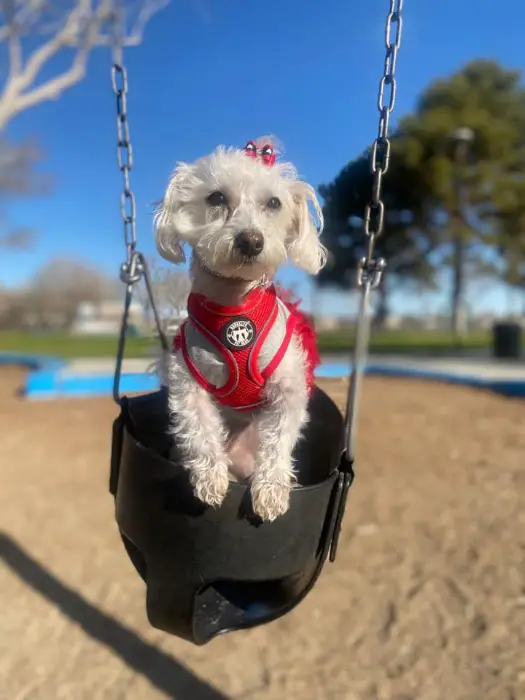Are you considering adding a Maltipoo to your family, but wondering about their lifespan? Understanding the average lifespan of a Maltipoo, the leading causes of death, and how to help your furry friend live a long and healthy life is important for any pet owner. In this guide, we’ll cover everything you need to know about the Maltipoo’s lifespan.

Related: Maltipoo Temperament Guide | Maltipoo Price Guide: How Much Does a Maltipoo Cost?
How Long Do Maltipoos Live?
The average Maltipoo lifespan is 12-16 years, with many living up to 13 years or more. This makes Maltipoos a relatively long-living dog breed.
Maltipoos lifespan is influenced by genetics, diet, exercise, and overall health care. Providing proper veterinary care, a balanced diet, regular exercise, and a loving environment can help ensure a Maltipoo lives a long and healthy life.
The Leading Cause of Death in Maltipoos
Maltipoos are generally healthy dogs, but like any breed, they can be prone to certain health problems, such as patellar luxation. This can impact their life expectancy, so regular check-ups with a vet and a balanced diet are important to help your Maltipoo live a long and healthy life.
One of the leading causes of death in Maltipoos is cancer. This can include various types of cancer such as lymphoma, mast cell tumors, and mammary gland tumors. Regular veterinary check-ups and screenings can help catch any signs of cancer early, increasing the chances of successful treatment.
Another leading cause of death in Maltipoos is heart disease, such as congestive heart failure and mitral valve disease. Monitoring your dog’s heart health, providing regular exercise, and feeding a heart-healthy diet can help prevent or manage heart disease in Maltipoos.
Maltipoos are also prone to dental issues such as periodontal disease, which can lead to infections and other health problems if left untreated. Regular dental care and cleanings are important for maintaining their overall health and preventing potential complications that could impact their life expectancy.
By addressing any potential issues early, you can help your Maltipoo live a longer and healthier life.
Related: 14 Maltipoo Health Problems To Know Before Buying
The Average Maltipoo Life Cycle

As we talk about the Maltipoo lifespan, we can see they have four life stages. They are newborn, puppy, adult and senior dog.
Newborn Maltipoo
Maltipoo puppies are adorable and require special care to ensure they grow into healthy adults. Early veterinary care and proper nutrition are essential during this stage.
This stage will most likely take place outside of your control, where a breeder will be looking after the needs of the newborn puppies, along with the mother, of course!
It is the breeder who will take the litter for their first veterinary visit as well as introduce the puppies to soild food.
Maltipoo Puppy

Once the Maltipoo puppy is ready to leave its mother, at around 8 weeks old, these gorgeous bundles of fluff are ready to go to their new forever homes.
Once you have brought your new Maltipoo puppy home, it’s a good idea to schedule a visit to your vet for a health check and to get them started on their vaccination schedule.
Maltipoo puppies need a diet that is high in protein and nutrients for their growth and development. It’s usually a good idea to continue to feed your new pup the same diet the breeder started them on. You can then slowly change the diet if you want but do it gradually to avoid any upset tummy. Look for high-quality puppy food specifically designed for small breeds. Be sure to follow the recommended feeding guidelines and monitor their weight to ensure they are growing at a healthy rate.
Keep them warm and comfortable. Maltipoo puppies are vulnerable to temperature changes and need a warm and cozy environment. Provide a soft and warm bed, and consider using a heating pad or hot water bottle to keep them comfortable if you are in cold conditions.
It’s important to start socializing your Maltipoo puppy from a young age. Expose them to different people, environments, and other animals, but be gentle and patient as they are still developing and can easily become overwhelmed.
This will be the time to begin potty training your puppy. Use positive reinforcement and consistency to teach them where to go to the bathroom.
Adult Maltipoo

Maltipoos mature and move into being an adult by about 1 year. At this stage, your Maltipoo is likely full of energy and enjoying life.
It’s important to ensure that your adult Maltipoo gets plenty of exercise to keep them physically fit and mentally stimulated. This can include daily walks, lots of playtime, and toys, such as puzzles, to keep them engaged.
Related: Maltipoo Exercise Requirements for Health and Happiness
Training sessions will also keep their minds sharp and provide mental stimulation.
A balanced diet for adult Maltipoos will maintain their overall health. Look for high-quality dog food that meets their nutritional needs and is appropriate for their size and activity level. It’s also important to monitor their weight and adjust their portion sizes as needed to prevent obesity.
Regular grooming including brushing and professional grooming will keep their coat in good condition. And regular dental care, including brushing their teeth and providing dental chews, can help prevent dental issues later on.
Related: Maltipoo Coat Types and How to Care for Them
Senior Maltipoo

As your Maltipoo ages, they may start to show signs of aging, such as reduced activity and potential health issues. Regular vet check-ups and special attention to their changing needs are important at this stage.
As we have seen, the average life expectancy of a Maltipoo is around 12-16 years. However, some Maltipoos may live longer with the right care and genetics.
By around 11 years, small dog breeds like Maltipoos are considered senior dogs.
So keep an eye on their health and well-being as they age, and make any necessary adjustments to their care routine to ensure they have a comfortable and happy senior life.
Maltipoo Signs of Aging

As Maltipoos age, they can experience a decline in energy, joint issues, or changes in behavior. Recognizing and addressing these signs will help in maintaining their quality of life.
Aging Maltipoos may become less energetic and active. They might prefer to rest more often and might not be as enthusiastic about playtime or walks.
As Maltipoos move into their senior years, they can develop arthritis or other joint issues, which can make it difficult and painful for them to move around. They might be reluctant to jump, run, or climb stairs.
Your older Maltipoo could exhibit changes in behavior such as increased irritability, anxiety, or clinginess. They could become more withdrawn or less interested in interacting with people or other pets.
Declining vision and hearing as a result of aging can mean they’ll startle easily, become disoriented, or have difficulty recognizing familiar faces or objects.
Older Maltipoos can develop difficulties controlling their bladder or bowels, leading to accidents in the house. They could also have an increased frequency of urination or defecation.
Although these sound a little scary, with proper care and attention, many of these age-related issues can be managed to help Maltipoos enjoy a comfortable and fulfilling life in their senior years.
What Factors Impact The Maltipoo Lifespan

Factors such as genetics, diet, exercise, and overall health can affect a Maltipoo’s lifespan. Being aware of these factors and making informed choices can help in extending your Maltipoo’s life expectancy.
Genetics
Just like with humans, genetics play a significant role in a Maltipoo’s lifespan. Breeding from healthy and long-lived parents can increase the chances of a Maltipoo living a longer life.
You can increase the likelihood of healthy genetics by purchasing your Maltipoo from a reputable breeder.
Good Diet
Providing a well-balanced and nutritious diet is crucial for a Maltipoo’s overall health and longevity. Poor nutrition can lead to various health issues that can shorten their lifespan.
Exercise
Regular exercise is needed to maintain a Maltipoo’s physical and mental well-being. Engaging in regular physical activity can help prevent obesity, improve cardiovascular health, and strengthen their muscles, ultimately contributing to a longer lifespan.
Overall Health
Veterinary check-ups, vaccinations, and preventative care are important for maintaining a Maltipoo’s overall health. Early detection and treatment of any health issues can significantly impact your Maltipoo’s lifespan.
Environmental Factors
Providing a safe and stress-free environment can also impact a Maltipoo’s longevity. Minimizing exposure to toxins, potential hazards, and stressful situations can contribute to a longer, healthier life.
Dental Care
Dental health is often overlooked but is an important factor in a Maltipoo’s lifespan. These smaller dog breeds are prone to dental problems. S good dental hygiene can prevent various health issues such as periodontal disease, which can affect their overall health and lifespan.
How to Help Your Maltipoo Live Longer

Providing proper nutrition, regular exercise, mental stimulation, and preventive healthcare can all contribute to keeping your Maltipoo healthy and happy, potentially extending their lifespan.
The foundation of a long and healthy life for your Maltipoo is a balanced and nutritious diet. Choose a premium dog food that is appropriate for your Maltipoo’s age, size, and activity level. Consider adding fresh fruits and vegetables as treats, and consult with your veterinarian for recommendations on supplements, if needed.
Maltipoos are an active breed and require daily exercise to maintain a healthy weight and to prevent boredom. Take them on walks, play fetch, or engage in other physical activities to keep them mentally and physically stimulated.
Mental enrichment is just as important as physical exercise for your Maltipoo’s overall well-being. Provide them with interactive toys, puzzle feeders, and training sessions to keep their mind engaged and prevent behavioral issues.
Regular visits to the veterinarian are important for detecting and preventing health issues. Your vet can advise you on vaccinations, parasite prevention, dental care, and other aspects of your Maltipoo’s healthcare needs.
Dental health is essential for your Maltipoo’s overall health. Brush their teeth regularly and provide dental chews or toys to prevent tartar buildup and dental disease.
Obesity can lead to various health problems and reduce your Maltipoo’s lifespan. Monitor their food intake and avoid overtreating them with high-calorie snacks. Ensure they get enough exercise to burn off excess calories.
Regular grooming, including brushing their coat, cleaning their ears, and trimming their nails, can contribute to their overall comfort and health.
Keep your home and yard safe for your Maltipoo by removing hazards, providing a comfortable living space, and ensuring they are protected from extreme temperatures.
By adopting these practices, you can help your Maltipoo to live a longer, happier, and healthier life.
Related:
